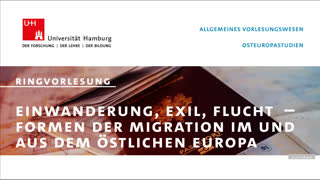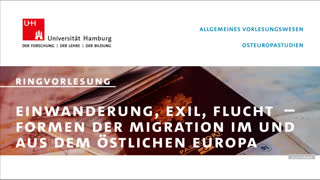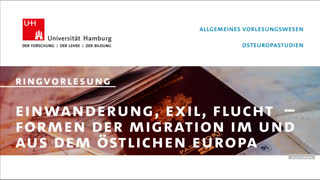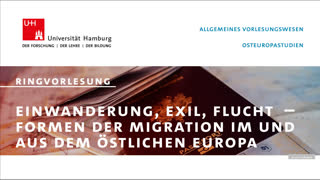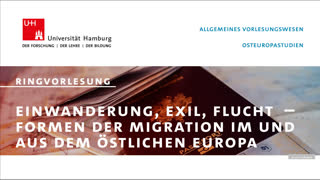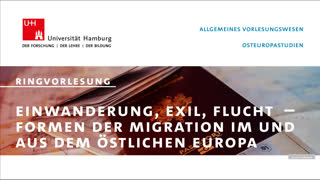Mnemonic Migration: Bosnian war literature and the sharing of memories across Europe - Tea Sindbæk Andersen - University of Hamburg
- Lecture2Go
- Catalog
- F.5 - Geisteswissenschaften
- Sprache, Literatur, Medien (SLM I + II)
- Einwanderung, Exil, Flucht – Formen der Migration im und aus dem östlichen Europa
Catalog
1111 Views
13.01.2023
Mnemonic Migration: Bosnian war literature and the sharing of memories across Europe
Ringvorlesung Osteuropastudien WiSe 2022/23
Gerade erlebt Deutschland durch Geflüchtete aus der Ukraine und der Exilierung russischer oder belarussischer Intellektueller Formen der Migration, die nach der Systemwende 1989/1991 und dem Ende des II. Weltkriegs historisch geworden zu sein schienen. Hierdurch treten andere Formen der Migration wie Arbeitsmigration, nomadische oder transnationale Lebensentwürfe in den Hintergrund, die in den letzten beiden Jahrzehnten die Wahrnehmung und öffentliche Diskussion des Themas dominiert haben. Die Ringvorlesung will die verschiedenen Formen von Exil, Flucht und Migration zwischen Deutschland und Mittelosteuropa und Osteuropa in den Blick nehmen und analysieren. Das Ziel der Vortragsreihe ist es, Formen geographischer und kultureller Mobilität aus dem Blickwinkel verschiedener Disziplinen (Geschichte, Kulturwissenschaft, Ethnologie, Literaturwissenschaft, Politikwissenschaften) zu beleuchten. Ein besonderer Schwerpunkt wird auf der Differenzierung von freiwilliger vs. erzwungener Migration (Flucht, Vertreibung, Exil) liegen.
================
Prof. Dr. Tea Sindbæk-Andersen explores how the war in Bosnia and Herzegovina 1992–1995 cost nearly 100.000 lives, and how it forced more than a million people to leave their homes, and it caused several hundreds of thousands to seek refuge elsewhere, in Europe or North America. Since the war, authors with a background in Bosnia and Herzegovina have published literary representations of the wartime events, thus contributing to a shared international memory of the Bosnian war. In this talk, I explore how such works of fictional literature narrate and translate Bosnian war memory to readers in the authors’ new home countries, and how readers both in Northern Europe and in Bosnia respond to these memory transmissions. The talk focuses on the literary works of Saša Stanišić and Aleksandar Hemon. I argue that fictional literature may help to establish a shared memory, though this is a difficult and complex process: in Northern Europe, Stanišić’ and Hemon’s texts both create an urge to remember and an alienated confusion. In Bosnia, however, such texts may contribute to creating a space for talking about the Bosnian war that goes beyond the rigidly divided ways of remembering the war that characterize Bosnian politics today.
Verantwortliche Organisation: Prof. Dr. Anja Tippner, Osteuropastudien / Slavistik, UHH; Prof. Dr. Monica Rüthers, Geschichte, UHH; Prof. Dr. J. Otto Habeck, Ethnologie, UHH In Zusammenarbeit mit DGO, Landeszentrale für Politische Bildung Hamburg, IKGN, HSU
================
Videoproduktion: eLearning-Büro der Fakultät für Geisteswissenschaften (uhh.de/gw-ebuero)
Technical support
Please click on the link bellow and then fill out the required fields to contact our Support Team!
RRZ Support Link

